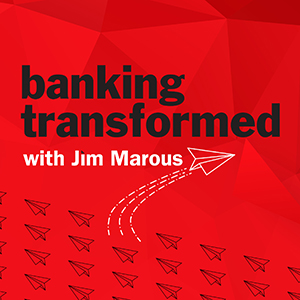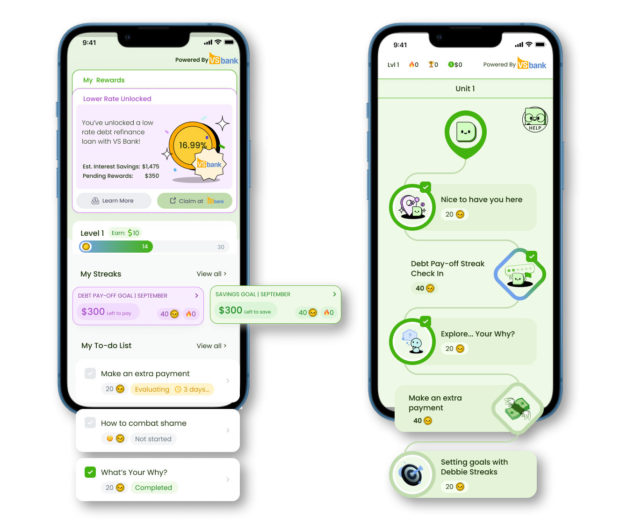Debt pressures are mounting on consumers as credit card balances near an all-time high and interest rates continue to rise. While banks sometimes assist consumers with rate reductions or refinance options, experts say the key to managing debt is changing habits around money.
Debbie, a new habit-shifting rewards platform, uses behavioral psychology, positive reinforcement, and rewards to help consumers pay off their credit card debt and change their behaviors. On a recent episode of the Banking Transformed podcast, hosted by Jim Marous, Debbie’s co-founders said the approach could benefit the consumers who struggle to pay and the banks that often struggle to collect.
“We’re trying to build a business that aligns incentives for the financial institutions and their constituents. So [financial institutions] can help them and at the same time drive better business outcomes,” said Frida Leibowitz, co-founder and CEO of Debbie.

Navigating the Role of AI in Financial Institutions
83% of FI leaders agree investing in AI is essential for 2024 but how you leverage AI is instrumental in success and meeting customer expectations.
Read More about Navigating the Role of AI in Financial Institutions

Are You Ready for a Digital Transformation?
Unlock the potential of your financial institution's digital future with Arriba Advisors. Chart a course for growth, value and superior customer experiences.
Changing Behaviors to Get Out of Debt
Due to stagnant incomes, skyrocketing inflation, and rising interest rates, Americans’ credit card balances are exploding. A study by WalletHub found credit card debt increased by 6%, or $67.1 billion, during Q2 2022, an amount 3.5 times larger than the post-Great Recession average for the year’s second quarter. Average credit card debt per household now stands at $8,942, compared to $8,558 in Q2 2021.
Leibowitz and COO Rachel Lauren founded the Debbie app in 2021 to shake up the traditional debt repayment industry. Lauren is a former venture capital investor with Bertelsmann Digital Media Investments. Leibowitz previously worked at Goldman Sachs. She also grew up in a single-parent household with little financial education, and racked up more than $15,000 of her own credit card debt by age 21.
The Problem at Hand:
Debt repayment solutions help reduce interest rates or lower monthly payments, but they do nothing to change behaviors.
Many consumers often fall into a debt cycle that is difficult to escape. And while banks ultimately want the revenues from consumers paying off their balances, they also benefit when consumers make minimum payments. Debt repayment solutions help reduce interest rates or lower monthly payments, but they do nothing to change behaviors. As a result, many consumers pay off their credit cards only to land back in debt later down the line.
“Ultimately, the problem was that people were spending more than they earn and automating the debt payoff away wasn’t going to solve the problem,” said Lauren.
Debbie strives to distinguish itself in the crowded debt repayment space by relying less on automation and more on getting consumers to actively address their underlying financial habits. The app, which is currently in beta and free to consumers, uses a curriculum of “mini-tasks” that leverage behavioral psychology and rewards to lead consumers into changing their habits. This includes Noom-style modules like “How to Unwind Habits” and quick-win actions like “Make an Extra Payment.”
Dig Deeper:
- How Behavioral Science Gives Bankers an Edge Acquiring Customers
- Using Behavioral Science for Financial Marketing Success
Shedding Debts with A Financial Diet
Debbie’s founders were inspired by Noom, the subscription-based web app that uses behavioral change and mental wellness to drive weight loss. While Noom tracks food intake and exercise, its real value is in the lessons and psychological strategies that lead users to change their behaviors. The popular app currently has more than 45 million users in 100 counties, and one study found that 80% of users lost weight by using the app.
The Task at Hand:
Banks have to change consumers' inherent relationship and behavioral patterns with money.
Like Noom, Debbie is designed to change habits and takes a gradual approach. It’s not a quick fix and requires users to be “very engaged in the experience,” said Leibowitz. “You have to change their inherent relationship and behavioral patterns with money. The fact that we focus a lot on behavioral psychology education rather than counting calories for people is a big reason our users engage at high rates and keep going back to the app.”









